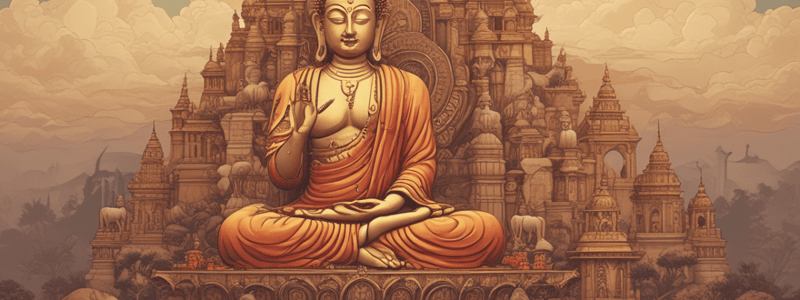Podcast
Questions and Answers
What is the ultimate goal of achieving nirvana in Buddhist belief?
What is the ultimate goal of achieving nirvana in Buddhist belief?
- To attain wealth and material possessions
- To gain supernatural powers
- To break the cycle of reincarnation and exist spiritually (correct)
- To be reborn in a higher caste
Which type of Buddhism is considered more conservative and focused on self-liberation from suffering?
Which type of Buddhism is considered more conservative and focused on self-liberation from suffering?
- Tibetan
- Zen
- Mahayana
- Theravada (correct)
Who played a significant role in spreading Buddhism in ancient India?
Who played a significant role in spreading Buddhism in ancient India?
- Mahayana monks
- Emperor Ashoka (correct)
- The Buddha himself
- Kublai Khan
Where was Siddhartha Gautama, the founder of Buddhism, born?
Where was Siddhartha Gautama, the founder of Buddhism, born?
Which region is dominated by Theravada Buddhism?
Which region is dominated by Theravada Buddhism?
What was Siddhartha's realization after witnessing the suffering of others?
What was Siddhartha's realization after witnessing the suffering of others?
What is the focus of Mahayana Buddhism?
What is the focus of Mahayana Buddhism?
What is the term for the state of peace and connection with the universe achieved through enlightenment?
What is the term for the state of peace and connection with the universe achieved through enlightenment?
How did Siddhartha achieve enlightenment, according to Buddhist texts?
How did Siddhartha achieve enlightenment, according to Buddhist texts?
How do Mahayana Buddhists view the Buddha?
How do Mahayana Buddhists view the Buddha?
What was Kublai's attitude towards other religions?
What was Kublai's attitude towards other religions?
Why did Buddhism spread throughout various regions?
Why did Buddhism spread throughout various regions?
How did Buddhism spread throughout Central Asia?
How did Buddhism spread throughout Central Asia?
Why was China receptive to Buddhist teachings?
Why was China receptive to Buddhist teachings?
What happened to Buddhism in India by the 12th century C.E.?
What happened to Buddhism in India by the 12th century C.E.?
Flashcards are hidden until you start studying
Study Notes
Buddhism in India
- Buddhism originated in ancient India, including parts of modern-day Nepal, in the 6th or 5th century B.C.E.
- Siddhartha Gautama, the founder of Buddhism, was born in Lumbini, in the Himalayan foothills, as a prince and later renounced his royal life to seek enlightenment.
- Siddhartha's realization of the inevitability of suffering in life led him to believe that earthly pleasures fade away, prompting him to live in a forest and eventually meditate under a bodhi tree for 7 weeks to obtain enlightenment.
- Siddhartha was later named "Buddha," meaning "enlightened one," and went on to teach others about his discoveries.
Key Spiritual Teachings
- The Four Noble Truths outline Buddha's beliefs on what causes and what can end human suffering.
- The Eight-Fold Path and the Middle Way relate to living a balanced life to achieve enlightenment.
- Buddhist teachings revolve around the steps and lifestyle needed to reach enlightenment, a state of peace and connection with the universe.
Beliefs and Practices
- Most Buddhists do not believe in a deity, viewing Buddha as a spiritual teacher rather than a god.
- Buddhists believe in meditation to help reach nirvana, a state achieved through enlightenment that brings an end to suffering.
- Nirvana is related to the belief in reincarnation, with the goal of breaking the cycle of death and rebirth.
- Buddhists also believe in karma, the spiritual version of cause and effect.
Types of Buddhism
- There are two main branches of Buddhism: Theravada and Mahayana, with multiple subsets and localized variations.
- Theravada Buddhism focuses on self-liberation from suffering and is most dominant in Thailand, Sri Lanka, Cambodia, Burma, and Laos.
- Mahayana Buddhism is more ritualistic, focuses on helping others, and is dominant in China, Korea, Japan, Taiwan, Vietnam, and Singapore.
Spread of Buddhism
- After Buddha's time, his followers, including monks and nuns, were responsible for spreading his messages.
- Ashoka the Great, a Mauryan Indian ruler, converted to Buddhism and spread it throughout India and other countries in the 3rd century B.C.E.
- Emperor Kanishka and Kublai Khan also played significant roles in the spread of Buddhism throughout their kingdoms.
Why Did Buddhism Spread?
- The purpose of spreading Buddhism was to help alleviate the suffering of others and promote peace and enlightenment.
- The appeal of Buddhism was great, as it promised an end to suffering and a path to peace and eventual enlightenment.
How Did Buddhism Spread?
- The Buddha first spread his teachings along the border regions of India and Nepal, and others continued his teachings after his death.
- Monks and nuns set up villages and traveled to spread teachings throughout India and beyond, using the Silk Road to spread to Central Asia and other regions.
Where Did Buddhism Spread?
- Buddhism began in India and Nepal and spread to Ceylon, Burma, Tibet, Japan, China, Central Asia, and beyond.
- Buddhism was fairly easily accepted in these countries due to cultural and philosophical similarities.
Result of the Spread of Buddhism
- Buddhist philosophies reached a large region of the world as a religion, while Buddhist teachings and practices, such as meditation and contemplation, have spread even to people who do not identify as Buddhist.
Studying That Suits You
Use AI to generate personalized quizzes and flashcards to suit your learning preferences.




